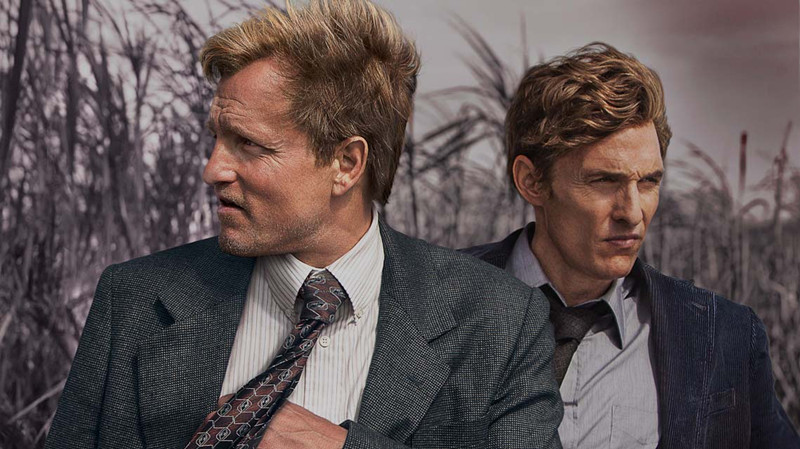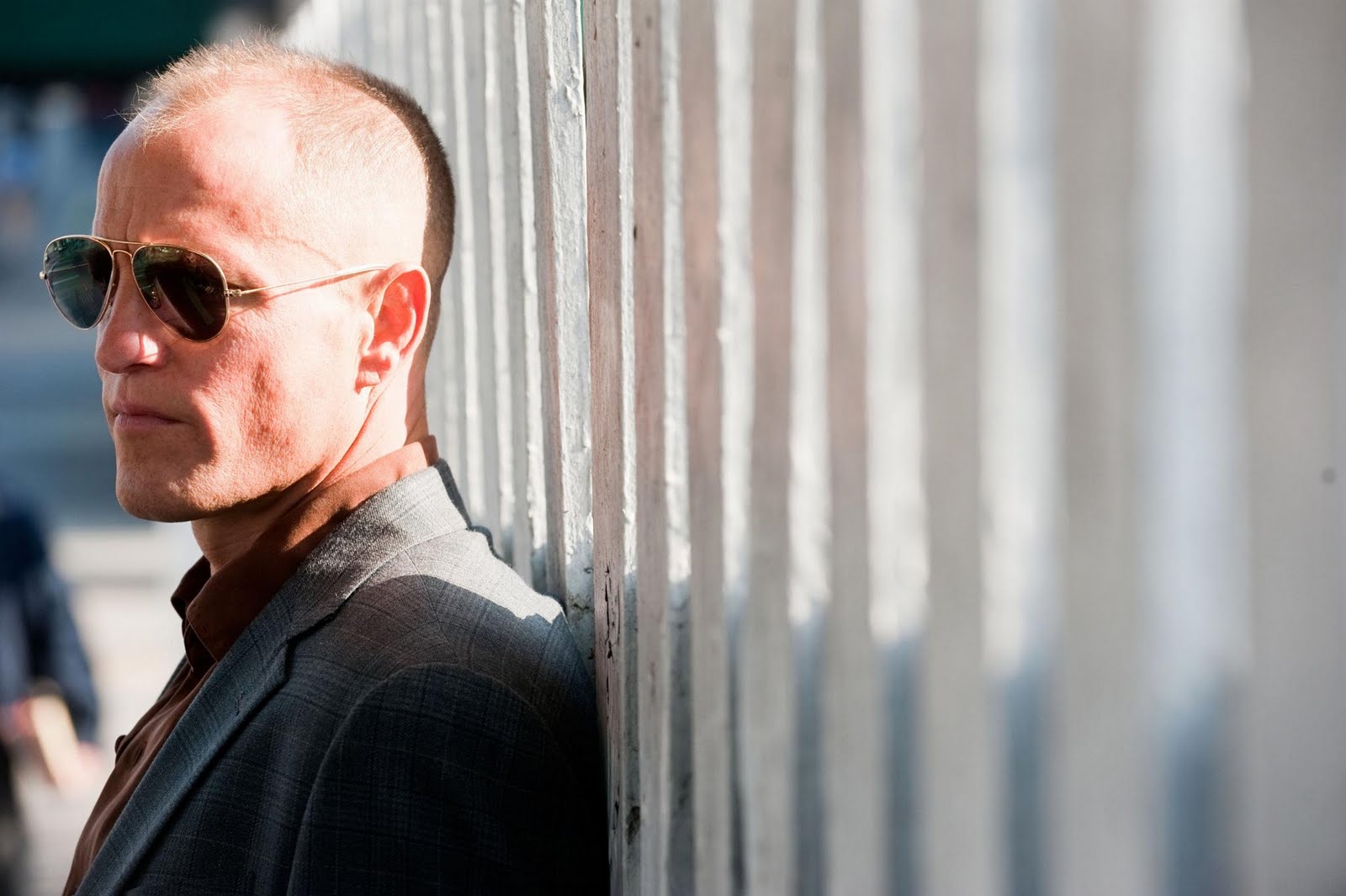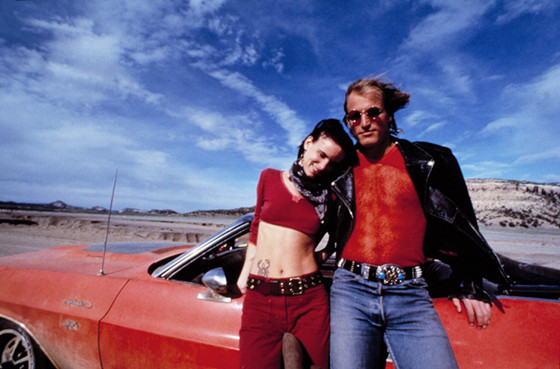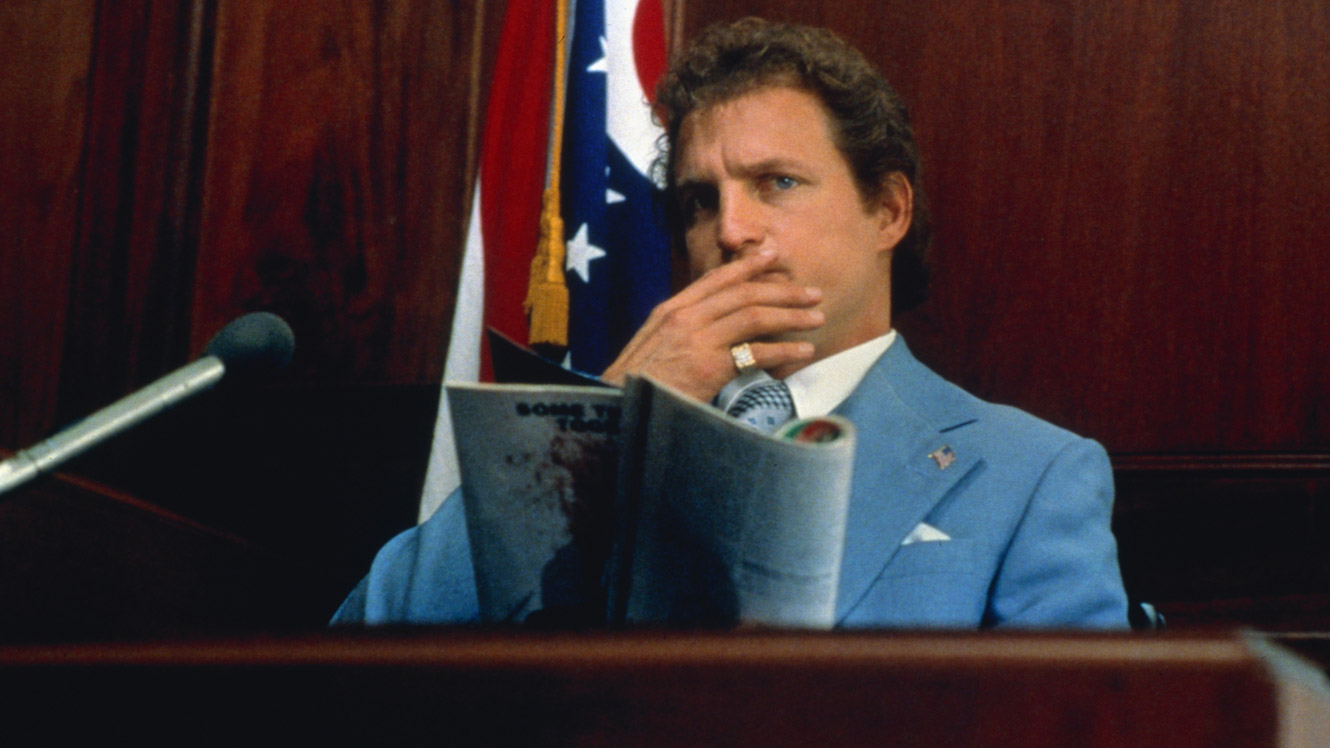5. and 4. Cheers (1985-1993) and True Detective (2014)

It would be a crime not to acknowledge the best of Harrelson’s onscreen work without mentioning his two most renowned and respected forays into the world of television. Cheers, of course, caught Harrelson at the beginning of his career. After getting his break on Broadway in a production of Neil Simon’s Biloxi Blues, Harrelson’s career quickly rose to national recognition when he joined the already-established ensemble to one of the most successful and popular American sitcoms of all time.
In the role of Boston bartender Woody Boyd, Harrelson gives us an iconic, seemingly simplistic, depiction of a dim-witted, all-American Midwestern good ol’ boy. He is comic fodder, but always manages to be loveable and relatable without ever tipping into parody or losing his grasp on his character’s humanity. Harrelson’s comedic timing and his inherent “cuteness” may have made him an international star, but it was really only the beginning of showing audiences what he was truly capable of.
Over twenty years after Cheers went off the air, Harrelson returned to television in a completely different show and with a completely different role that successfully showcased his growth over the years in Nic Pizzolatto’s renowned HBO series, True Detective.
In the show’s self-contained first season, Harrelson plays Marty, a flawed southern detective family man who is partnered with a very spacey, socially awkward, and downright odd partner in the form of Detective Cole, played brilliantly by Matthew McConaughey. Together, they both spend years investigating a gothic serial murderer that progressively leads them to revelations of small-town secrets and extreme religious corruption.
Undoubtedly, Harrelson’s work in True Detective was unfairly overshadowed by McConaughey’s flashier (but nonetheless great) portrayal of a drugged-out monologue-sprouting, near-mystic “seer”. That being said, it is impossible to deny that Harrelson’s presence and support paved the way for McConaughey’s scene-stealing role.
The result of the show, and the relationship between the two men, wouldn’t have been half as successful without Harrelson’s grounded, reactionary, and subtle work to fully complement McConaughey’s savant-like and darkly ingenious space cadet.
Simply put, Harrelson had the hardest role in True Detective and it’s almost impossible to notice that because of how committed he is to playing his flawed but still undeniably heartfelt character as real and as messy as possible. Harrelson’s Marty, who is a womanizer and a drinker that takes his loving wife and family for granted, isn’t exactly an easy character to like. Harrelson’s gift shines through, however, because the audience is still able to follow him and relate to him, in spite of how despicably he may behave at times.
We see the thought and the contradictions behind Harrelson’s eyes at all times. In part, he is a selfish man who is unable to control his primal impulses, regardless of how they effect the people he loves. As a whole, however, he is a flawed and broken man who is drawn towards a career that he cares about deeply but that also slowly kills his soul and forces him to find relief in any unsavory way he can find.
Not to downplay McConaughey’s unquestionable brilliance and (very justified) critical accolades, but it’s truly Harrelson who grounds True Detective. His character is a flawed hero, one who we may not always like, but also one we can’t help but get behind and, ultimately, root for. Not many actors can pull off a role like that, and it’s even more impressive that an actor with Harrelson’s clout and charisma would have the humility and skill to take on such a role that, to a blind eye, could easily come across as being thankless.
From Cheers to True Detective, the growth in Harrelson’s talent as an actor is insurmountable. He went from being a loveable comedic performer who had the opportunity to show off his skill and affability to a very approving nation to being a true actor who could drop his bag of tricks at a moment’s notice for the sake of the story he’s helping to tell. In True Detective, Harrelson and all his charms disappear into a character who may not be wholly sympathetic, but who is unquestionably real and wholly believable.
3. Rampart (2011)

Harrelson re-teams with his Messegner director Oren Moverman for Rampart, a down-and-dirty modern noir story that was co-written by the famed crime fiction author James Ellroy.
Once again, Harrelson runs the risk of tainting his once-loveable screen presence by playing a corrupt police officer who is simultaneously facing serious charges of misconduct while also juggling his dysfunctional and near-polygamist home and family life. The result is a brilliant character study, and also one of the best performances of Harrelson’s already-great career.
There’s no mistaking that Harrelson’s character is not a good man. He is a low-life, a killer, a bully, and a corrupter who will try to slime his way out of the consequences of any and all of his wrong-doings (even when they have some form of redemption, such as his act of going above the law to murder a known rapist).
What makes the character, and Harrelson’s portrayal of him, so compulsively watchable, however, is that he genuinely is able to excuse his behavior and view himself as a decent man. Anyone watching the film knows otherwise, but the pain of seeing
Harrelson’s character come to terms with who he is by the film’s end is as interesting and as complex as any work that Harrelson has ever accomplished on film. He’s a man who thinks he’s good and just by buying into his own skewered and perverse rationalities.
Without show and by resisting the common “actor’s urge” to wear such conflict on his sleeve, Harrelson once again creates an utterly believable character that is eternally imprisoned by his own lack of awareness to the darkness in his own soul.
2. Natural Born Killers (1994)

Oliver Stone’s adaptation of an early Quentin Tarantino script gave Harrelson the first opportunity to show us the dark side behind that boyish, devilish grin that his many years of playing Woody Boyd made world-famous.
The brilliance of the role, and how Stone directed him in it, is that Harrelson uses his sitcom personality and presence to play a highly charismatic, and hopelessly violent, serial killer who reaches world-wide fame and adulation for the acts of his atrocities (aided by some heavily romanticized and sensationalized media coverage). The resulting performance was a turning point for Harrelson that utilized both his strengths as a showman and as a seasoned, dramatic actor.
The horror of Harrelson’s portrayal of Mickey Knox is that he truly is a likable presence (until, of course, he starts uncontrollably murdering innocent people). He can charm the pants off of everyone to unsuspecting victims he eventually kidnaps to an oblivious news crew he’s patiently waiting to blast away with multiple shot gun bursts.
Stone tapped into a violence behind Harrelson’s eyes that no one had fully seen or exploited before, and the result opened the door to a career that was able to challenge and expose the raging, raw complexities behind Harrelson’s then seemingly-safe and simplistic talents.
1. The People Versus Larry Flynt (1996)

Milos Forman’s film (written by Ed Wood biopic masters Scott Alexander and Larry Karaszewski) about famed smut peddler and inadvertent freedom fighter Larry Flynt is arguably the true cinematic masterpiece that can be found on Harrelson’s already-impressive resume. Harrelson’s performance itself is also, to date, a career-best (which is no small feat when taking into consideration the work that made this list, not to mention all the great work there wasn’t quite enough room for).
Harrelson’s accomplishment in Flynt, like all of his best work, appears effortless. On one hand, his onscreen charm has never been better utilized. We see Harrelson as Flynt lead an army of misfits into (at the time) uncharted territory: He popularizes pornography in 1970s American bible belts, fights the most trivial of laws (at first, for no other reason than to make a buck… or rather millions of them), and accomplishes it all with the charisma and confidence that only a natural-born leader could muster.
In short, it’s not hard to understand why Harrelson as Flynt has so many followers. It’s highly believable that someone who exhibits the intelligence and cleverness that Harrelson portrays so naturalistically in the role would have the courage and expertise to go as far as he does in the film.
What makes the performance truly great and memorable, however, is Harrelson’s depiction of Flynt’s downfall when he inevitably has to pay some severe prices for playing games with America’s most conservative laws.
Flynt is imprisoned, institutionalized, paralyzed from an assassin’s bullet, and ultimately loses the love of his life (a mesmerizing and brilliant mess of a performance by Courtney Love that only Courtney Love could do). Harrelson’s confidence turns to defeat, his charisma turns to vulnerability, and his passion for life turns into an embittered period of pain, addiction, and depression.
The ride of the film, and in Harrelson’s work, doesn’t end there, however. The last act of the film sees Harrelson getting his soul back, rolling around in a wheelchair like a maniac, and fighting back at the system with everything he has like an impassioned zealot with a severe axe to grind. It is rewarding and exhilarating to see Harrelson as Flynt fight against the standards of middle-American morality, it’s twisted legal system, and all the losses he’s incurred from a very biased and narrow-minded establishment.
Harrelson’s portrayal of Larry Flynt has many arcs, many nuances, and many layers. His leading actor Oscar nomination for the film was well-deserved and, perhaps, overlooked when he didn’t take home the prize.
Harrelson’s work in The People Versus Larry Flynt is a series of master strokes: He plays a character who is larger than life, who has more fascinating stories than the collected population of most major cities, and who goes to every extreme imaginable for, at first, his own personal gain and, eventually, for his sincere and overwhelming desire to fight for what he truly believes to be right.
Every transition in Flynt’s arc is seamlessly, effortlessly, and brilliantly portrayed by Woody Harrelson, a great actor in a performance so wonderful that it’s almost easy to forget you’re not watching a behind the scenes documentary of Flynt himself. When it’s all said and done, however, we have to remember and give credit to the fact that we are, indeed, witnessing one of America’s greatest actors at work in one of the best roles of his already-impressive career.
Author Bio: Matt Hendricks is an independent filmmaker with several projects currently in development.